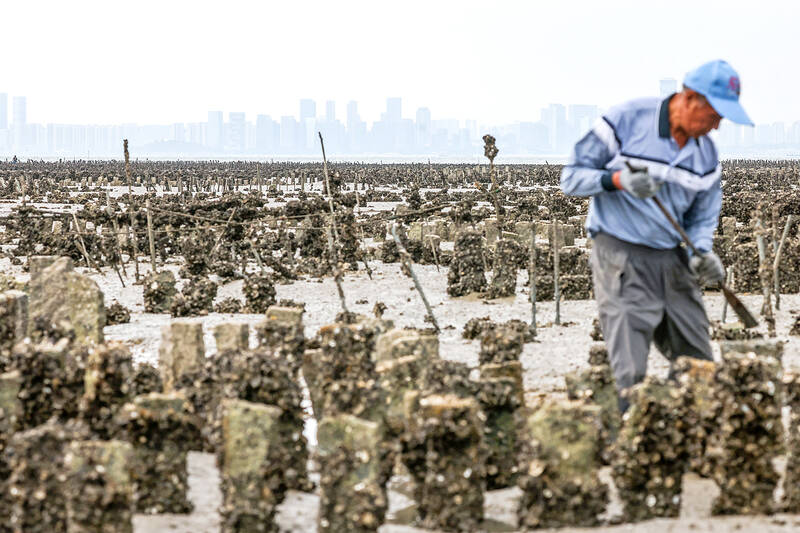On Kinmen, oyster farmer Li Kai-chen collects molluscs on a shore known for its bloody battle over control of Taiwan.
While the 66-year-old has worked to keep tradition alive on Kinmen, the island has found itself on the front line of Chinese war games.
“These centuries-old oyster beds not only produce food, they represent a culture and a history,” he said.

Photo: Cheng I-hwa, AFP
China launched two-day military drills on Thursday last week around Taiwan and its outlying islands, three days after President William Lai (賴清德) was sworn in, part of an escalating campaign of intimidation by China.
Kinmen’s oyster farmers said they were accustomed to the shows of Chinese might, and would focus instead on collecting molluscs.
“I’m more afraid of the tide than of China,” said a woman who declined to give her full name.
Their historic oyster farm is less than 5km from Xiamen, a Chinese megacity filled with skyscrapers.
Li stood among rows of granite blocks brought from China more than 400 years ago where the oysters grow.
He used a metal staff to scrape them off — a farming method unique from shuckers typically taken off reef rocks.
The blocks are also embedded on the site of defining clashes, when the Chinese Nationalist Party (KMT) army of Chiang Kai-shek (蔣介石) fled to Taiwan in 1949 after losing the Chinese Civil War to the Chinese Communist Party.
Known as the Battle of Guningtou, they fended off the communist troops under Mao Zedong (毛澤東) on those beaches, successfully retaining Kinmen under the KMT’s control.
“During the war, people fled to survive and the oyster beds were abandoned,” Li said.
Until 1979, Kinmen faced regular bombardment from the Chinese People’s Liberation Army, and it was massively fortified by Chiang’s troops.
Chinese President Xi Jinping (習近平) has upped the rhetoric in recent years and vows that Taiwan’s “unification” with China is “inevitable”.
A loudspeaker the size of a building, historically used by the military to broadcast propaganda to the communist troops on the other side, is now a tourist attraction.
Down on the shore, Li lamented that their farming method is at risk largely because “young people don’t want to work in this industry.”
He used some seawater to clean the shells, which are smaller than those farmed industrially in China.
Kinmen oysters are also distinguished by their light, melt-in-the-mouth texture due to exposure to the wind and sun at low tide on the granite blocks.
They are typically prepared in omelets slathered with a viscous sauce — a Kinmen delicacy that Taiwanese tourists often seek when visiting the island.
Taiwan’s plummeting relations with China have meant that Chinese travelers are no longer among Kinmen’s visitors — something Li hopes will change.
“I hope there will be more [Chinese] tourists coming so we will have business,” Li said.

Taiwan is to have nine extended holidays next year, led by a nine-day Lunar New Year break, the Cabinet announced yesterday. The nine-day Lunar New Year holiday next year matches the length of this year’s holiday, which featured six extended holidays. The increase in extended holidays is due to the Act on the Implementation of Commemorative and Festival Holidays (紀念日及節日實施條例), which was passed early last month with support from the opposition Chinese Nationalist Party (KMT) and Taiwan People’s Party. Under the new act, the day before Lunar New Year’s Eve is also a national holiday, and Labor Day would no longer be limited

COMMITMENTS: The company had a relatively low renewable ratio at 56 percent and did not have any goal to achieve 100 percent renewable energy, the report said Pegatron Corp ranked the lowest among five major final assembly suppliers in progressing toward Apple Inc’s commitment to be 100 percent carbon neutral by 2030, a Greenpeace East Asia report said yesterday. While Apple has set the goal of using 100 percent renewable energy across its entire business, supply chain and product lifecycle by 2030, carbon emissions from electronics manufacturing are rising globally due to increased energy consumption, it said. Given that carbon emissions from its supply chain accounted for more than half of its total emissions last year, Greenpeace East Asia evaluated the green transition performance of Apple’s five largest final

Taiwan is to extend its visa-waiver program for Philippine passport holders for another year, starting on Aug. 1, Minister of Foreign Affairs Lin Chia-lung (林佳龍) said on Friday. Lin made the announcement during a reception in Taipei marking the 127th anniversary of Philippine independence and the 50th anniversary of the establishment of the Manila Economic and Cultural Office (MECO) in Taiwan, the Ministry of Foreign Affairs said. The decision reflected Taiwan’s commitment to deepening exchanges with the Philippines, the statement cited Lin as saying, adding that it was a key partner under the New Southbound Policy launched in 2016. Lin also expressed hope

Temperatures in New Taipei City’s Sindian District (新店) climbed past 37°C yesterday, as the Central Weather Administration (CWA) issued heat alerts for 16 municipalities, warning the public of intense heat expected across Taiwan. The hottest location in Taiwan was in Sindian, where the mercury reached 37.5°C at about 2pm, according to CWA data. Taipei’s Shilin District (士林) recorded a temperature of 37.4°C at noon, Taitung County’s Jinfeng Township (金峰) at 12:50 pm logged a temperature of 37.4°C and Miaoli County’s Toufen Township (頭份) reached 36.7°C at 11:40am, the CWA said. The weather agency yesterday issued a yellow level information notice for Taipei, New